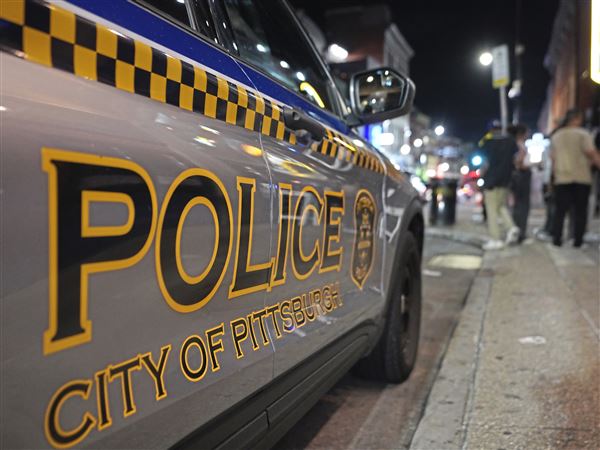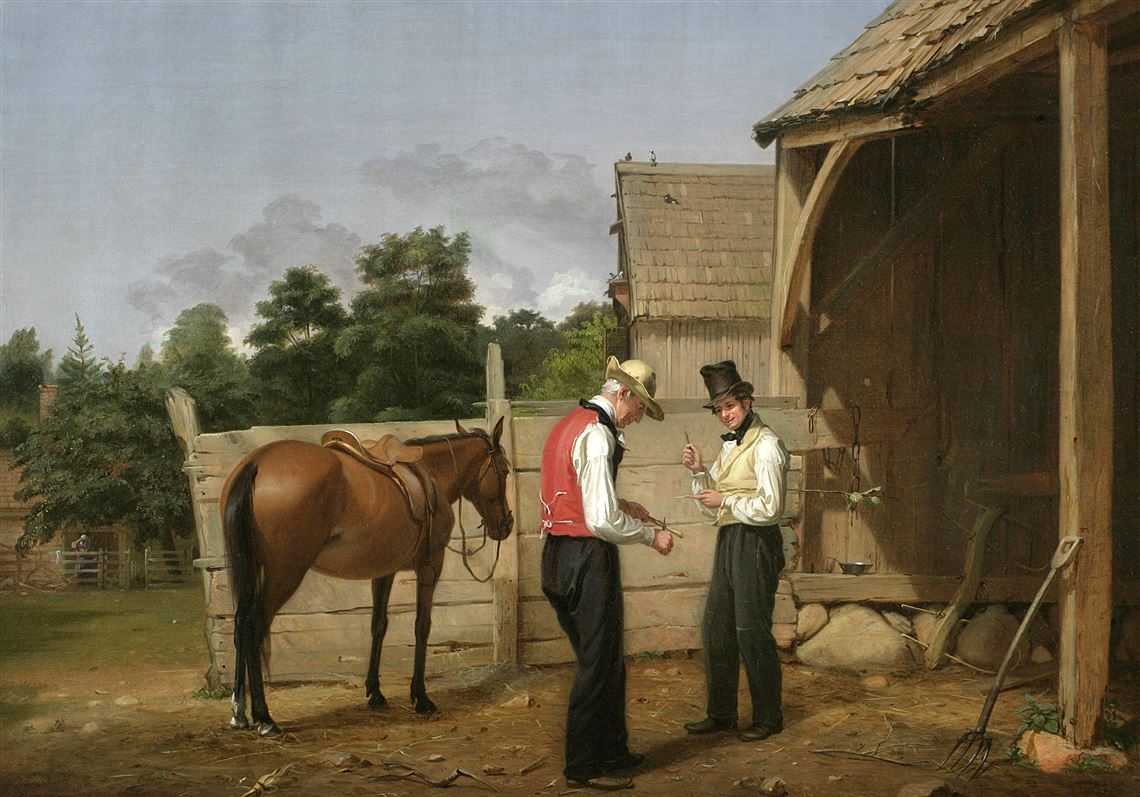Controlling the narrative has been a big issue in the recent political campaigns, but it’s nothing new to nation building. A handsome exhibition at the Westmoreland Museum of American Art contains images that reflect the story of a young country — in turn realistic, embellished, idealized and sometimes covert.
“Telling Tales: Stories and Legends in 19th-century American Art” runs through Sunday and comprises 53 artworks from the New-York Historical Society, itself a national treasure. It includes images and artists that any schoolchild would know.
The line of somberly dressed men, women and children walking across an equally stark winter landscape, “Pilgrims Going To Church” by George Henry Boughton, is a visual that is integral to our Thanksgiving lore, the devout and long-suffering community that stopped to give thanks in the midst of hardship. “The Puritan,” a bronze by the esteemed Augustus Saint-Gaudens, is more formidable, with his stern face, billowing cloak and determined stride.
Rembrandt Peale’s iconic portrait “George Washington,” painted a half-century after his death, shows a mature leader who projects the dignity of the father of a country, while John Gadsby Chapman sets a much younger Washington within a landscape, perhaps one he is surveying.
Other stories are less familiar, or more controversial.
Tompkins Harrison Matteson pictures Native Americans, “The Last of the Race,” pushed figuratively and literally to the end of the continent; Pocahontas is shown saving Captain John Smith; and John Brown blesses an African-American child.
The Civil War is the subject of two paintings. The more realistic “An Episode of the War — the Cavalry Charge of Lt. Henry B. Hidden” (1862) by Victor Nehlig, is a detailed representation painted in the midst of the conflict. “Charging the Battery” (1882) by William Gilbert Gaul is more interpretative and emotional, perhaps indicative of the ongoing reflection being given this horrendous chapter in the American story.
William Sidney Mount is a notable genre painter whose images were at times not as straightforward as they appear to contemporary eyes, signaling through such things as clothing an individual’s political leanings. Cultural attitudes toward outsiders were often indicated by positioning them in a doorway or an edge of a composition. A painting like James Henry Cafferty’s “Street Scene,” an encounter between a young girl and a woman, is enigmatic now but may have spoken to class distinctions.
Other works have subjects less specifically American but revealing of what was popular and acceptable at the time in art, including mythology, European history, Shakespearean plays and religion. Mostly it’s a rich opportunity to experience such a large and instructive gathering this side of the Hudson.
“Tales” continues through Sunday at 221 N. Main St., Greensburg. Hours are 11 a.m.-5 p.m. Tuesday through Sunday and until 7 p.m. Wednesday. Admission is $15 suggested donation; $10 seniors; free for children 18 and under, students, veterans, active duty and reserve military and their families, and members. Information: 724-837-1500 or www.thewestmoreland.org.
Killer Heels talk
The curator of the attention-grabbing exhibition “Killer Heels: The Art of the High-Heeled Shoe” will speak about their history at 7 p.m. Thursday at The Frick Art Museum, 7227 Reynolds St., Point Breeze. Lisa Small, curator of exhibitions at the Brooklyn Museum, will discuss the fashion accessory from the 16th century until today. Advance registration and pre-payment are required ($12, members $10) at www.thefrickpittsburgh.org or 412-371-0600.
Ai Weiwei film talk
Alison Klayman, director and producer of the 2012 documentary film “Ai Weiwei: Never Sorry,” will speak at 7 p.m. Friday at The Andy Warhol Museum, 117 Sandusky St., North Side. She will be joined by Jessica Beck, museum associate curator of art, and Geralyn Huxley, museum curator of film and video. Admission is free.The film is screened at 2 p.m. daily at the museum in conjunction with the exhibition “Andy Warhol/Ai Weiwei.” Information: www.warhol.org or 412-237-8300. For a film review, go to www.post-gazette.com and search by title.
M. Thomas: mthomas@post-gazette.com or 412-263-1925.
First Published: June 15, 2016, 4:00 a.m.

















